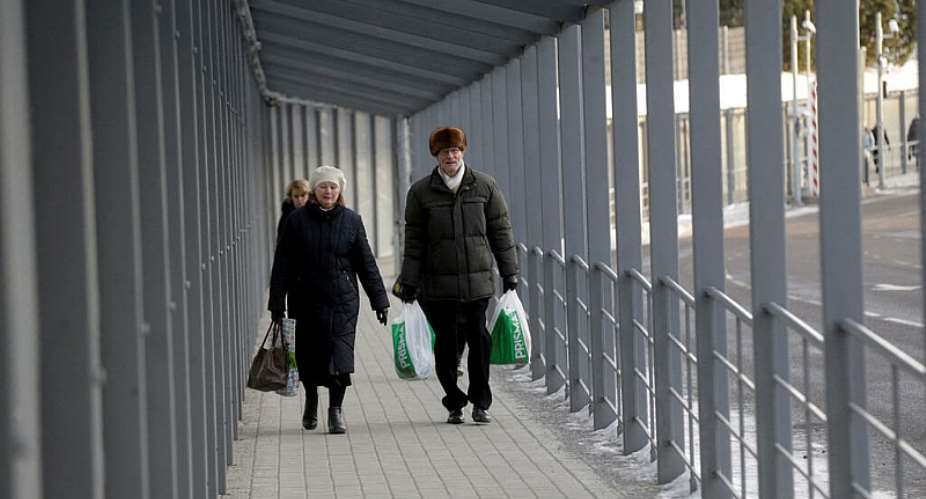The European Union is planning to suspend a visa facilitation agreement with Russia, and several countries are pushing for an outright ban on deliveries of Russian tourist visas.
At a meeting of European Union foreign ministers meeting in Prague on Tuesday and Wednesday focusing on the six-month-old war in Ukraine, member states are likely to agree on principle on suspending a Russia visa request deal, which would make it more difficult for Russians to travel to the bloc.
The measure, which if approved would come into force in October, mean Russians would pay 80 euros instead of 45 euros for EU visas and also face a more lengthy procedure.
The EU had already suspended visa facilitation for Russian official delegations and business leaders, but would now extend it to other short stay visits.
The move would slow the number of Russians travelling to the EU's Schengen travel zone and would increase Moscow's international isolation following its invasion of Ukraine.
But it does not amount to a formal ban on tourism visas that some of Russia's EU neighbours are pushing for.
The Czech Republic, which holds the EU's rotating presidency, has stopped issuing regular visas to Russian tourists and has pushed for an EU-wide ban on visas for Russian tourists.
The 26 countries in the Schengen travel zone – the 22 EU member states plus Norway, Iceland, Switzerland and Liechtenstein – handled 536,000 Russian short stay visa requests in 2021.
Czech Prime Mininister Petr Fiala said on Monday that the EU needs to send a clear signal, and a suspension of tourist visas would be a step in the right direction.
The idea is supported Poland, Finland and Baltic countries that share a land border with Russia – the main point of entry for Russians into the bloc since direct flights between Russia and the EU were suspended after the start of the Ukraine war.
But an outright visa ban is opposed by other member states, including Germany, along with the bloc's foreign policy and security chief, Josep Borrell, who argue that banning visas outright might breach EU rules and would cut off Russian dissidents.
The issue will be debated at the foreign ministers meeting, but is not expected to be resolved in the two days. A full visa ban would be part of a new sanctions package and would need unanimous support from all member states.
Lithuanian Foreign Minister Gabrielius Landsbergis has said Estonia, Latvia, Lithuania, Poland and Finland may act on their own to block tourists if the EU does not agree on a ban.
(with wires)





 Former Kotoko Player George Asare elected SRC President at PUG Law Faculty
Former Kotoko Player George Asare elected SRC President at PUG Law Faculty
 2024 elections: Consider ‘dumsor’ when casting your votes; NPP deserves less — P...
2024 elections: Consider ‘dumsor’ when casting your votes; NPP deserves less — P...
 You have no grounds to call Mahama incompetent; you’ve failed — Prof. Marfo blas...
You have no grounds to call Mahama incompetent; you’ve failed — Prof. Marfo blas...
 2024 elections: NPP creates better policies for people like us; we’ll vote for B...
2024 elections: NPP creates better policies for people like us; we’ll vote for B...
 Don’t exchange your life for wealth; a sparkle of fire can be your end — Gender ...
Don’t exchange your life for wealth; a sparkle of fire can be your end — Gender ...
 Ghana’s newly installed Poland train reportedly involved in accident while on a ...
Ghana’s newly installed Poland train reportedly involved in accident while on a ...
 Chieftaincy disputes: Government imposes 4pm to 7am curfew on Sampa township
Chieftaincy disputes: Government imposes 4pm to 7am curfew on Sampa township
 Franklin Cudjoe fumes at unaccountable wasteful executive living large at the ex...
Franklin Cudjoe fumes at unaccountable wasteful executive living large at the ex...
 I'll 'stoop too low' for votes; I'm never moved by your propaganda — Oquaye Jnr ...
I'll 'stoop too low' for votes; I'm never moved by your propaganda — Oquaye Jnr ...
 Kumasi Thermal Plant commissioning: I pray God opens the eyes of leaders who don...
Kumasi Thermal Plant commissioning: I pray God opens the eyes of leaders who don...
